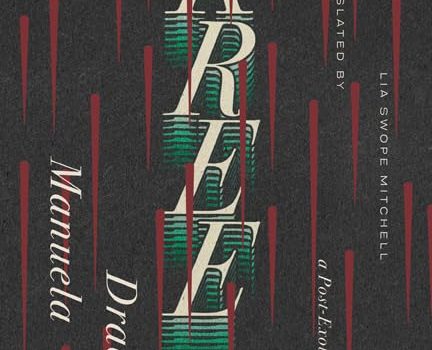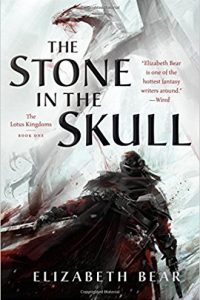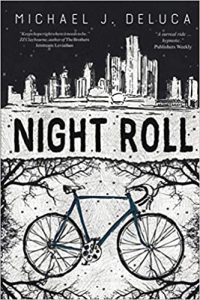Kree by Manuela Draeger: Review by Jake Casella Brookins
 Kree, Manuela Draeger (University of Minnesota Press 978-1-51791-512-4, $21.95, 280pp, tp) October 2024.
Kree, Manuela Draeger (University of Minnesota Press 978-1-51791-512-4, $21.95, 280pp, tp) October 2024.
Manuela Draeger’s Kree is so immediately violent that I wasn’t sure it was going to be for me. Somehow, though, within just a few chapters, the novel’s mix of haunting imagery and almost humorous unpredictability grew so compelling that I found myself wanting to track down everything else the author has written. A midapocalyptic story set in a succession of afterlives, rife with intense bodily detail and hallucinatory visions and ideas, Kree is a bizarre but entrancing meditation on endings and returns.
Translated from the French by Lia Swope Mitchell, the novel begins with Kree Toronto, virtuoso violence-dealer in a devastated world, as she sets out to avenge her dog, Loka. And it follows her, after she seems to die in the very first chapter, into a series of strange new lives. Although set on Earth, it’s not clear how far in the future it is, or if we’re following Kree to alternate realities or different spiritual planes, but the sense of apocalypse is never far from the text:
She understood that the end of the world had been going on for centuries, with periods of slowness and even calm, and periods of acceleration, and that right in the middle of one of these periods of acceleration, she’d had the misfortune to be born. Or rather, to be reborn.
After moving through one afterlife in which she must cut her way through a seemingly endless series of chain-link fences, Kree finds herself in a relatively stable community: an unnamed, partially reclaimed city where the “terrible mendicants,” a group who have laid Marxist-Leninist ideas over a mix of shamanistic and Buddhist traditions, enforce order. Inexplicably reunited with Loka and dealing with a strange medical condition that causes torrential downpours of blood to fall around her, Kree makes a few friends before disasters, human and metaphysical, strike again.
With just a slight difference in tone, the bleakness of the novel could have overpowered it – besides Kree’s graphically violent action scenes, it is loaded with images of corpses piled deep in pits and trenches. There’s plenty here that reminded me of Cormac McCarthy’s The Road, with its dreamlike scenes of barren disaster. But there’s a kind of bizarro exuberance to Kree that somehow keeps it from being a downer, despite its fixation on death. Even the misanthropy that textures much of the novel is delightfully grounded in detail – Kree has a keen sense of smell, for instance, and this adds a literally noxious but fascinating layer to her contentious interactions – and there’s a constant eruption of strange or magical concepts, sometimes seen and sometimes only rumored, that creates a space of lively uncertainty and unpredictability, even in the face of so much death.
Those strange rumors and realities are part of what elevates this novel. Most prominently, there are giant eggs that surface from mass graves, reportedly, to hatch reborn humans or massive birds; bodies don’t stay dead; and spiders wait to celebrate humanity’s final extinction. Kree put me a little in mind of K.J. Bishop’s The Etched City or even Alasdair Gray’s Lanark: the violence and the wasteland, yes, but also strange wonders, strange signs and portents. Some of the most transporting passages occur right in the midst of the novel’s most macabre scenes, as when one character, inside an egg in the “monstrous superposition of the dead,” coming back to life by “a disgusting magic that horrifies,” nonetheless forms a beautiful psychic connection with another egg-dweller. And there’s frequently something magical in how Draeger presents shifting realities, from chapter to chapter and sometimes even within a scene, sometimes even drifting into pataphor (when what seems to be a poetic metaphor becomes real, for a while), as though the narrative itself is, fruitfully, reminding us that only the words here are real.
Obviously, postapocalyptic novels are not a new form; what sets Kree apart, besides its use of reincarnation and the bardo, is the way it feels both set apart from our current world – a magical world, operating by different rules, in some distant future – and firmly connected to it. Haunted by it. Even the main character’s name makes one wonder how it connects to today: Is there still a Toronto, or the memory of it, in this world? Is “Kree” a spelling of “Cree,” the Indigenous people? Genocide and extinction are points the novel returns to repeatedly: discussing a variety of cultures both recognizable and fantastic, two characters at one point feel “the shadows of innumerable annihilated peoples” swirl around them. And although all the characters we meet are distant survivors of whatever disaster or polycrisis started the end of the world, we still get a sense of how they’re culpable, how they can’t avoid recreating their own cruel little apocalypses, the “insatiable human desire to make things worse” still going strong.
Despite these serious, often morbid themes, there’s another aspect of Kree that pulled me through the narrative, one hard to pin down: humor. There’s something slyly, patiently, mordantly funny about the book, from Kree’s grunge metaphysical indifference to the patent absurdity of a phone installation specialist haggling over fees in a world without electricity. Draeger – who, it turns out, is one member of the “imaginary collective” of heteronyms of Antoine Volodine – taps into both the tragedy and the comedy of rebirth, leavening a story that might otherwise sag with dread. Whenever Kree faces death, it’s less “oh no” and more “this again?”
Interested in this title? Your purchase through the links below brings us a small amount of affiliate income and helps us keep doing all the reviews you love to read!
Jake Casella Brookins is from the Pennsylvania Appalachians, and spent a fantastic amount of time in the woods. He studied biology, before switching over to philosophy & literature, at Mansfield University. He’s been a specialty coffee professional since 2006. He’s worn a lot of coffee hats. He worked in Upstate New York and Ontario for about 8 years. He’s been in Chicago since 2013; prior to the pandemic, he worked for Intelligentsia Coffee in the Loop. Starting in 2021, he’s been selling books at a local indie bookstore. He lives with his wife, Alison, and their dogs Tiptree & Jo, in Logan Square.
This review and more like it in the September 2024 issue of Locus.
 While you are here, please take a moment to support Locus with a one-time or recurring donation. We rely on reader donations to keep the magazine and site going, and would like to keep the site paywall free, but WE NEED YOUR FINANCIAL SUPPORT to continue quality coverage of the science fiction and fantasy field.
While you are here, please take a moment to support Locus with a one-time or recurring donation. We rely on reader donations to keep the magazine and site going, and would like to keep the site paywall free, but WE NEED YOUR FINANCIAL SUPPORT to continue quality coverage of the science fiction and fantasy field.
©Locus Magazine. Copyrighted material may not be republished without permission of LSFF.











Have a look : https://fr.wikipedia.org/wiki/Antoine_Volodine